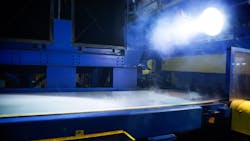As the steel vs. aluminum battle wages on in the automotive world, Alcoa (IW 500/53) (AA) is bringing a new technology to the lightweighting fight.
The aluminum producer has developed a new manufacturing process that allows it to make an aluminum alloy that is 40% more formable and 30% stronger than existing aluminum.
That means, in short, that Alcoa is addressing in one fell swoop some of the major hurdles keeping aluminum from becoming a more pervasive material on vehicles. Using its Micromill technology, it is creating a more flexible, stronger aluminum that is 30% lighter than high-strength steel.
“Alcoa Micromill represents a major breakthrough in aluminum materials,” said Alcoa Chairman and Chief Executive Officer Klaus Kleinfeld. “This technology will unlock the next generation of automotive products with strength, formability and surface quality combinations never before possible.”
The amount of aluminum per vehicle is expected to increase elevenfold in North America from 2012 to 2025, according to Ducker Worldwide. Notably, Ford's 2015 F-150 already is being produced with an aluminum-alloy body.
What has hindered that greater adoption of aluminum, however, has largely been the lack of flexibility of aluminum. Because Micromill aluminum is 40% more formable, it will be easier to shape and thus be used for the parts like the inside panels of vehicle doors and external fenders that are traditionally made with steel, Alcoa says.
Alcoa already has conducted successful customer trials with the product in San Antonio, and is qualifying the material for next-generation automobiles.
About the Author
Ginger Christ
Ginger Christ, Associate Editor
Ginger Christ is a former associate editor for EHS Today, a Penton publication.
She has covered business news for the past seven years, working at daily and weekly newspapers and magazines in Ohio, including the Dayton Business Journal and Crain's Cleveland Business.
Most recently, she covered transportation and leadership for IndustryWeek, a sister publication to EHS Today.
She holds a bachelor of arts in English and in Film Studies from the University of Pittsburgh.
